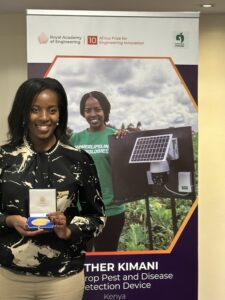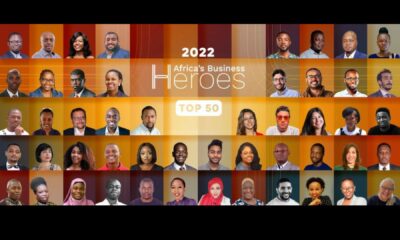Inspired
Kenya’s Esther Kimani wins 2024 Africa Prize for Engineering Innovation

Esther Kimani, a computer programmer from Kenya, has won the UK’s Royal Academy of Engineering’s Africa Prize for Engineering Innovation. Her groundbreaking early crop pest and disease detection device wowed the judges, thanks to its remarkable ability to swiftly detect and identify agricultural pests and diseases. This innovative tool can reduce crop losses for smallholder farmers by up to 30% and boost yields by as much as 40%.
In Kenya alone, millions of small-scale farmers (around five million) lose a staggering third (33%) of their crops due to pests and diseases.
Esther’s invention tackles this head-on. It provides real-time alerts within seconds of an infestation, along with specific recommendations for intervention. But that’s not all! This innovative device also notifies government agricultural officials about pest or disease outbreaks, enabling broader efforts to manage these challenges across the agricultural sector.
Harnessing the power of solar energy, the device employs computer vision algorithms and advanced machine learning to detect and identify crop pests, pathogens, or diseases, and the nature of the infection or infestation. Farmers receive notifications via SMS, making this an affordable alternative to traditional detection methods at just $3 per month—significantly cheaper than hiring drones or agricultural inspectors.
To further develop her innovation, Esther was awarded KSh 8.3 million (£50,000) the largest amount ever given to a winner in honour of the Africa Prize’s 10th anniversary. Reflecting on her win, Esther shared, “My parents would lose up to 40% of their crops each farming season, which affected our standard of living. We are empowering smallholder farmers, many of whom are women, to increase their income. We aim to scale to one million farmers in the next five years.”
The three runners up who were each awarded KSh 2.5 million to develop their innovations, were:
Eco Tiles, Kevin Maina, Kenya:
- An environmentally friendly roofing material made from recycled plastic. Stronger and lighter than clay or concrete tiles, the innovation is a dual solution to plastic pollution and high building costs.
- The innovative manufacturing process involves a custom-made extrusion machine that blends different plastics at varying temperatures, eliminating the need for energy-intensive processes like kiln-burning and reducing carbon emissions. The tiles are enhanced with UV stabilisation chemicals and construction sand to improve durability and sturdiness.
La Ruche Health, Rory Assandey, Côte d’Ivoire:
- La Ruche Health connects communities to vital health information, advice, and services through “Kiko”, an AI chatbot tool available on WhatsApp and mobile apps, and a digital backend solution to streamline documentation, billing, and data sharing for practitioners.
- By May 2024, the AI has facilitated over 150,000 user interactions and 189 in-home and teleconsultation appointments, processing over $18,000 in medical billings, illustrating its effectiveness and scalability.
Yo-Waste, Martin Tumusiime, Uganda
- Addressing Uganda’s mounting waste crisis, Yo-Waste is a location-based mobile application that connects homes and businesses to independent agents for efficient on-demand rubbish collection and disposal.
- Yo-Waste currently serves over 1,500 customers including homes, businesses, and waste collection agents, with a goal to reach 20,000 users by 2026.
The remaining innovations shortlisted for the 2024 Africa Prize were:
Beba-Beggie, Charles Oduk, Kenya – An IoT automated locker technology offering affordable, accessible, secure and convenient short-term storage.
Biomass Briquettes, Ludo Ntshiwa, Botswana – An environmentally-friendly clean fuel that harnesses the green energy of biowaste to produce a renewable energy source for heat production as a substitute for charcoal.
Kiri EV, Christopher Maara, Kenya – An end-to-end affordable and clean energy mobility provider, from electric motorcycles, scooters and tuktuks to battery charging infrastructure across Kenya.
MAVUNOLAB Solar Dryer, Dr Evodius Rutta, Tanzania – A low-cost solar-powered dryer developed to help small-scale fish processors and farmers in off-grid locations by enhancing food safety and hygiene for perishable food products.
Microfuse Stick Computer, Ivan Karugaba, Uganda – A compact and affordable device that plugs into any screen, projector or monitor to transform it into a Wi-Fi-connected computer, increasing computer access and digital inclusivity.
Myco-Substitutes, Abubakari Zarouk Imoro, Ghana – An eco-friendly sewage treatment that uses viruses, bacteria, and fungi to treat and feed on faecal waste and produce yarn and leather substitutes.
PenKeep, Adaeze Akpagbula, Nigeria – A climate-smart remote sensing device that monitors and controls environmental conditions in poultry farms, ensuring optimal health and productivity of chickens.
Second-Life Batteries, Léandre Berwa, Rwanda – A solution that repurposes retired electric vehicle (EV) batteries to be assembled as a backup power supply for telecom towers and mini electricity grids.
The Kitchen Box, Tunde Adeyemi, Nigeria – An affordable biogas digester technology that turns organic waste into animal feed and organic fertiliser and generates clean energy for heating and cooking.
The annual Africa Prize for Engineering Innovation, established by the Royal Academy of Engineering in 2014, champions innovators who develop sustainable and scalable engineering solutions to local challenges in Africa.



















